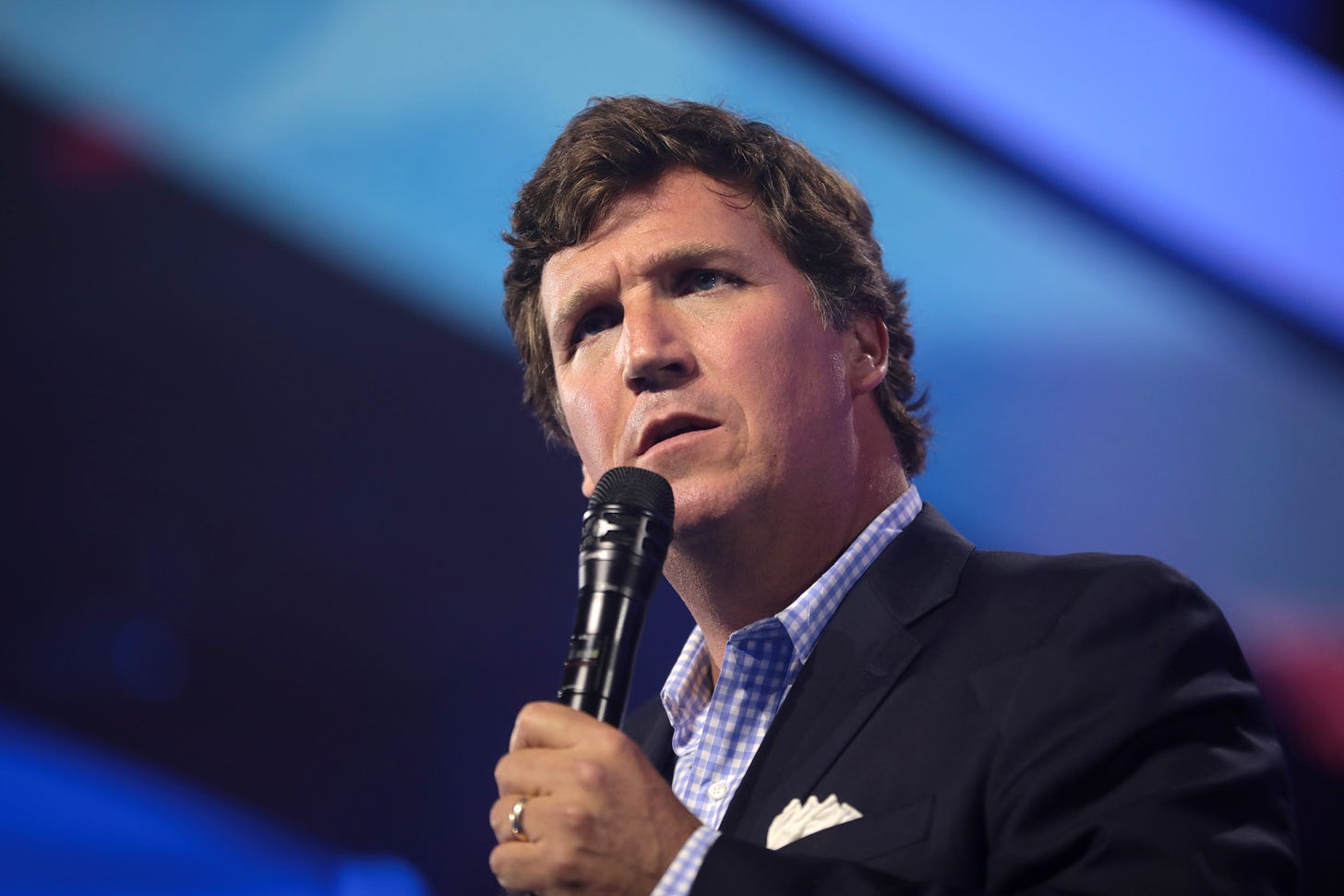Why do American conservatives now care about Palestinian Christians?
The American Right's views on Palestine are shifting, fast. It was coming even before October 7.

Conservative talk show host Tucker Carlson ran an interview with Bethelehem’s Reverend Munther Isaac on Tuesday about the Christian-Palestinian plight. “When there's a war abroad that the United States is funding, it is Christians who tend to die disproportionately,” Carlson said. The interview, of course, sparked a furious reaction from pro-Israel conservatives.
About a year ago, in an essay titled “Muslim-American conservatives and the Palestinian question,” I had noted that young right-wing Americans seemed to be turning against Israel, although slower than their left-wing peers. A few months later, I predicted that the Republican Party was headed for a “showdown” over Israel and Palestine.
Aid and diplomatic support against Palestine are only a small part of Israel’s demands on U.S. policy…So far, these appear to be cost-free positions. However, Saudi Arabia is asking for guarantees of U.S. military protection in order to join the Abraham Accords, and Israel has long demanded a U.S. military strike on the Iranian nuclear program. If and when the prospect of sending Americans to kill and die becomes more real, figures like [then presidential candidate Vivek] Ramaswamy will find it harder to sidestep the question of support for Israel.
That showdown seems to have arrived. First it came in fits and spurts. Donald Trump said some not-so-nice things about Israeli public relations after October 7 and the minor-but-influential right-wing media personality Candace Owens had a public falling out with her pro-Israel employer.
Now the showdown is moving towards the center stage. While Carlson is not a consensus figure, he is mainstream enough that his interview will force conservatives to deal with a very uncomfortable aspect of their Israeli-Palestinian politics.
It’s easy to dismiss these developments as the return of right-wing antisemitism in the guise of the Palestinian cause. Fringe figures like Nick Fuentes have basically admitted to using Palestine as a vehicle for antisemitic activism, and Carlson telling his nationalist audience about Christians oppressed by Israel would seem to touch the same nerve. But the debate over Israel is also tapping into more serious contradictions on the Right.
The younger generation of conservatives has been turning against all the things that Israel stands for in U.S. politics: foreign aid, ideological foreign policy projects, and social justice “safetyism.” At the same time, the older generation of Republicans consider pro-Israel politics a red line, rooted in deeply emotional memories and religious fervor.
For the past decade or so, conservatives have squared the circle by pretending that Israel is a self-sufficient ally — unlike Ukraine — that handles its region of the world so that Americans don’t have to. Congresswoman Marjorie Taylor Greene recently made the laughable claim that Israel is winning its wars without spending “one single American dollar.”
Even before October 7, it was obvious that Israel was headed towards a big conflict with Iran, which would demand more direct U.S. intervention than just some financial aid. I had always assumed that the flashpoint would be over Iran’s nuclear program. In that case, Republicans may have been able to get away with criticizing the U.S.-Israeli relationship without really touching the Palestinian issue.
Instead, the “big one” ended up being an explosion of Israeli-Palestinian violence that reignited other regional conflicts. The American relationship with Palestinians is now impossible to ignore, partly because left-wing criticisms have broken through to the mainstream debate, partly because the U.S. military is actually playing a much more direct role in Israel’s counterinsurgency than ever before.
And American lives are on the line. Three U.S. troops have already been killed in the regional spillover of the conflict. President Joe Biden is publicly vowing to get involved in any direct Iranian-Israeli war, and has dispatched the top U.S. general in the Middle East to Israel while the country is supposedly under threat of Iranian missile strike.
Carlson’s camp of national conservatives, who have staked a big part of their political identity on the backlash to “forever wars” in the Middle East, can no longer sidestep fundamental questions about the nature of the U.S.-Israeli relationship or the Israeli-Palestinian conflict. By interviewing a pastor, Carlson has chosen the safest possible route for criticism, highlighting the Palestinian voice most likely to appeal to American conservatives.
Of course, it won’t sway everyone. Evangelical Zionists have already gotten comfortable dismissing Middle Eastern Christian voices. (After Carlson’s interview with Isaac, the prominent Reverend Johnny Moore called the pastor a “terror sympathizer” and “the high priest of antisemitic Christianity.”) Some America Firsters may also find that their anti-war commitments don’t run as deep as they claimed. As I predicted last year:
The party will not suddenly go anti-Israel as a whole, but could lose its unquestioned pro-Israel consensus. Younger populists like Ramaswamy may say taboo things about Israel, whether on purpose or by accident. The party establishment may also accuse candidates with unconventional foreign policy views of wanting to sell Israel down the river…If either scenario comes to pass, Israel will become a proxy for pro- and anti-establishment foreign policy views within the Republican Party, just as it has been for Democrats.
The next few months and years will be full of unpredictable events. However, the general trends are there — and have been — for everyone to see.


